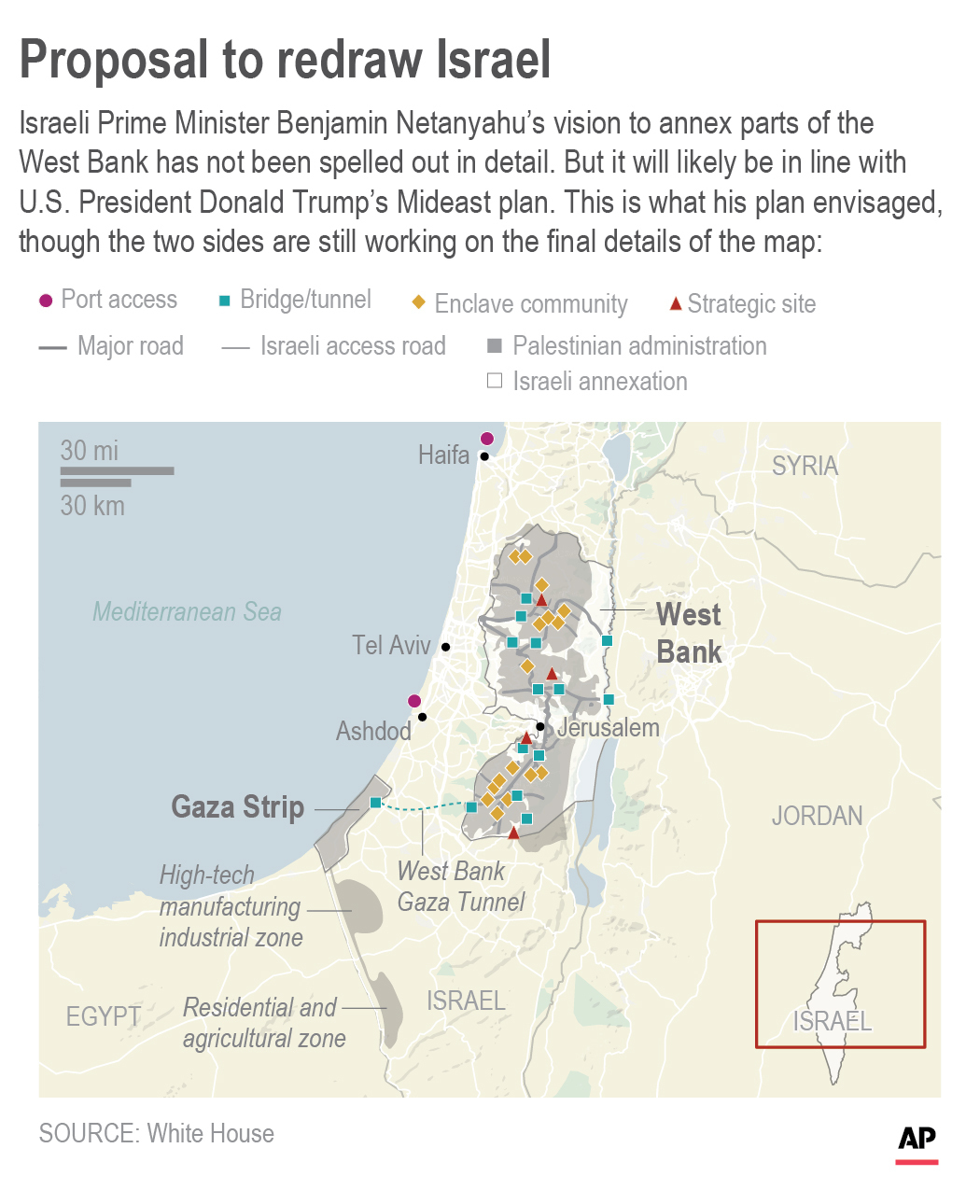Ofir Akunis says Israeli officials still working out final details with their American counterparts, but he expects controversial move to take place later this month

A confidant of Prime Minister Benjamin Netanyahu confirmed that the premier’s plan to annex parts of the West Bank would not start on Wednesday, the original target date.
The developments cast further uncertainty over whether Israel will ultimately follow through on the explosive annexation initiative, which has drawn fierce condemnations from some of Israel’s closest allies.
Speaking to Army Radio, Regional Cooperation Minister Ofir Akunis confirmed that the annexation process would not begin on Wednesday, saying that officials were still working out the final details with their American counterparts. He said he expected the annexation to take place later in July.
“Coordination with the American administration is not something that can be dismissed,” he said.
Netanyahu had aimed to start the process by Wednesday, saying he wanted to begin annexing West Bank territory in line with US President Donald Trump’s Mideast plan. The plan, unveiled in January, envisions bringing some 30 percent of the territory under permanent Israeli control, while giving the Palestinians limited autonomy in carved-up pockets of the remaining land.

But Netanyahu’s unilateral annexation project has come under stiff international criticism. The United Nations, the European Union and key Arab countries have all said Israel’s annexation would violate international law and undermine the already diminished prospects of establishing a viable independent Palestinian state alongside Israel. Even close allies, like Britain, have opposed it.
In a front-page article in the Yedioth Ahronoth daily, one of Israel’s largest newspapers, British Prime Minister Boris Johnson wrote Wednesday that as a “passionate defender of Israel” he was particularly troubled by its intentions. He noted his long links to Israel, dating back to when volunteered on a kibbutz as an 18-year-old and his “many visits” since then.
“I profoundly hope that annexation does not go ahead. If it does, the UK will not recognize any changes to the 1967 lines, except those agreed between both parties,” he said.
Israel captured the West Bank from Jordan in the 1967 Six Day War. Much of the international community considers the territory occupied land, and Israel’s 132 settlements there illegal. The Palestinians, who seek all of the West Bank as part of a future state, have rejected the Trump plan.
Several hundred Palestinians in the Gaza Strip took part in a small demonstration Wednesday, one of several that were expected in Palestinian areas.
While building scores of settlements that are now home to nearly 500,000 Israelis, Israel has never tried to annex West Bank territory before, saying the area is “disputed” and that its final status should be settled through negotiations.

Netanyahu has defended his annexation plan on both security and religious grounds and says the friendly Trump administration has provided a rare opportunity to redraw Israel’s borders. He is eager to move forward before November’s US presidential election, especially with Trump’s reelection prospects in question, and made sure that the coalition agreement for his new government included the July 1 date for him to introduce a plan to parliament. The coalition deal, however, also specifies that agreement must “be reached with the United States on the application of sovereignty,” and US officials held a series of meetings at the White House last week without publishing any decision on the matter.
Beyond international opposition, Netanyahu has encountered resistance from his Blue and White governing partners. Blue and White’s leader, Defense Minister Benny Gantz, this week said Wednesday’s target date was not “sacred” and suggested that annexation can wait while the government grapples with Israel’s coronavirus crisis. On Tuesday, Gantz said the Trump plan needs to be advanced “correctly, in bringing as many partners to this discussion from the countries of the region, with international backing.” He added: [We must] make every effort to connect with them and only then continue. And I think all the means to bring in the players have not yet been exhausted.”
US officials have indicated they do not want to move forward with a plan unless the two leaders are in agreement. Hebrew media reported Tuesday that Israel is seeking changes in a proposed US map for annexation, and that American officials are demanding an Israeli gesture to the Palestinians as compensation for any annexation that takes place.
The Times of Israel reported on June 3 that the US administration was “highly unlikely” to approve an Israeli move to unilaterally annex parts of the West Bank by the July 1 date.
As reported by The Times of Israel
